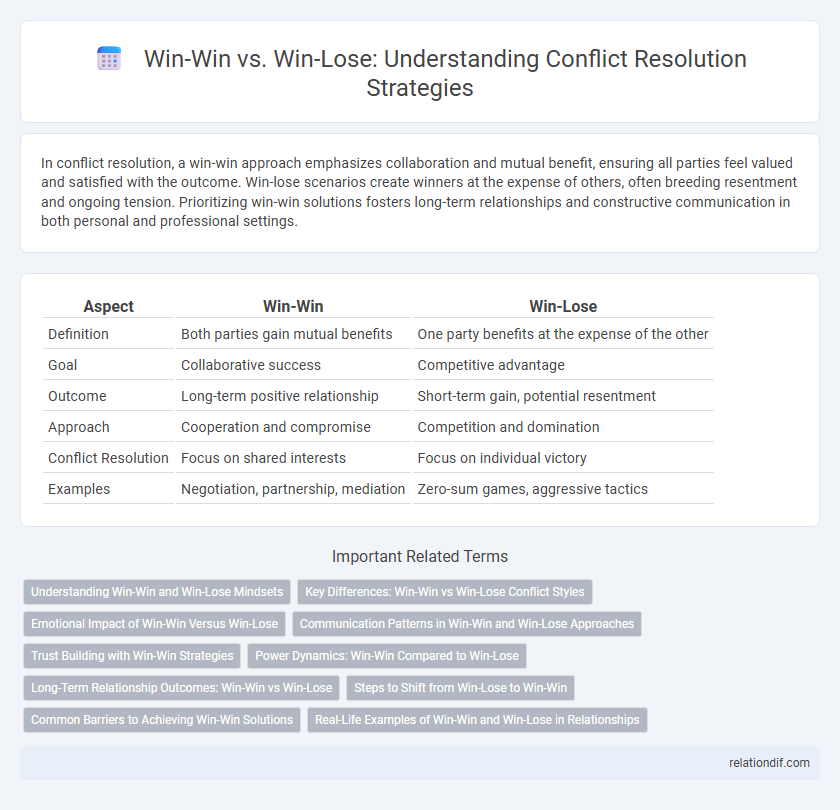In conflict resolution, a win-win approach emphasizes collaboration and mutual benefit, ensuring all parties feel valued and satisfied with the outcome. Win-lose scenarios create winners at the expense of others, often breeding resentment and ongoing tension. Prioritizing win-win solutions fosters long-term relationships and constructive communication in both personal and professional settings.
Table of Comparison
| Aspect | Win-Win | Win-Lose |
|---|---|---|
| Definition | Both parties gain mutual benefits | One party benefits at the expense of the other |
| Goal | Collaborative success | Competitive advantage |
| Outcome | Long-term positive relationship | Short-term gain, potential resentment |
| Approach | Cooperation and compromise | Competition and domination |
| Conflict Resolution | Focus on shared interests | Focus on individual victory |
| Examples | Negotiation, partnership, mediation | Zero-sum games, aggressive tactics |
Understanding Win-Win and Win-Lose Mindsets
Win-win and win-lose mindsets represent fundamentally different approaches to conflict resolution, where win-win aims for mutually beneficial outcomes and win-lose focuses on one party's gain at another's expense. Understanding the dynamics of these mindsets is crucial for fostering collaboration, improving communication, and achieving sustainable agreements. Emphasizing empathy, shared goals, and problem-solving strategies helps individuals and organizations shift from competitive to cooperative conflict management.
Key Differences: Win-Win vs Win-Lose Conflict Styles
Win-win conflict styles prioritize collaboration and mutual benefit, fostering solutions where all parties feel valued and satisfied, leading to long-term relationship building. Win-lose conflict styles emphasize competition and assertiveness, where one party's gain often results in another's loss, potentially damaging trust and cooperation. Key differences include the focus on shared goals in win-win versus individual victory in win-lose, along with differing impacts on communication, emotional climate, and future interaction quality.
Emotional Impact of Win-Win Versus Win-Lose
Win-win conflict resolutions foster mutual respect and long-term trust, significantly reducing stress and emotional distress for all parties involved. In contrast, win-lose outcomes often breed resentment, diminish self-esteem, and escalate hostility, intensifying negative emotional experiences. Prioritizing empathetic communication and collaboration in conflict management enhances emotional well-being and strengthens relationships.
Communication Patterns in Win-Win and Win-Lose Approaches
In win-win communication patterns, parties engage in active listening and empathetic dialogue to understand each other's perspectives, fostering collaborative problem-solving and mutual respect. Win-lose approaches often involve aggressive assertiveness, interruptions, and one-sided messaging aimed at dominating or defeating the other party. Effective conflict resolution hinges on adopting open, transparent communication to achieve equitable outcomes rather than a zero-sum mindset dominated by power struggles.
Trust Building with Win-Win Strategies
Win-win strategies focus on trust building by promoting open communication, shared goals, and mutual respect, which fosters collaboration and long-term relationships. Creating solutions that satisfy all parties reduces hostility and encourages transparency, resulting in increased confidence and reliability. This approach contrasts with win-lose scenarios where competition breeds distrust and hinders effective cooperation.
Power Dynamics: Win-Win Compared to Win-Lose
Win-win conflict resolution emphasizes balanced power dynamics by fostering collaboration and mutual benefit, reducing the likelihood of domination or resentment. In contrast, win-lose scenarios often amplify power imbalances, where one party's gain directly corresponds to the other's loss, leading to entrenched conflict and resistance. Effective conflict management leverages win-win strategies to create sustainable agreements by equalizing influence and encouraging shared goals.
Long-Term Relationship Outcomes: Win-Win vs Win-Lose
Win-win conflict resolution fosters sustainable relationships by encouraging collaboration and mutual benefit, which enhances trust and communication over time. In contrast, win-lose approaches often damage relationships, creating resentment and reducing future cooperation potential. Long-term relationship outcomes are significantly more positive in win-win scenarios due to their emphasis on shared goals and problem-solving.
Steps to Shift from Win-Lose to Win-Win
Shifting from a win-lose to a win-win conflict resolution requires identifying common interests and fostering open communication to build trust between parties. Emphasizing active listening and empathy helps clarify underlying needs, enabling collaborative problem-solving that benefits all involved. Establishing clear, mutual goals and agreeing on fair solutions encourages cooperation and long-term relationship sustainability.
Common Barriers to Achieving Win-Win Solutions
Common barriers to achieving win-win solutions in conflict include entrenched mindsets, lack of effective communication, and power imbalances between parties. Emotional biases and fear of vulnerability often prevent mutual understanding and collaboration. Overcoming these obstacles requires intentional empathy, open dialogue, and equitable negotiation strategies.
Real-Life Examples of Win-Win and Win-Lose in Relationships
In conflict situations, win-win outcomes foster mutual respect and long-term cooperation, exemplified by couples who negotiate compromises that satisfy both partners' core needs. Conversely, win-lose dynamics often arise in competitive work relationships, such as when one employee's promotion results in another's career setback, creating resentment and ongoing tension. Real-life examples highlight how prioritizing collaborative solutions can transform conflicts into opportunities for stronger connections and shared success.
win-win vs win-lose Infographic

 relationdif.com
relationdif.com